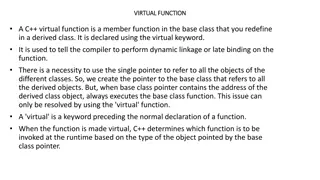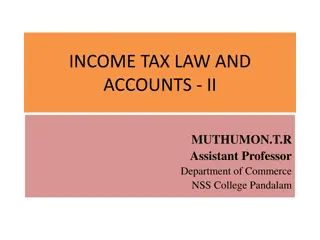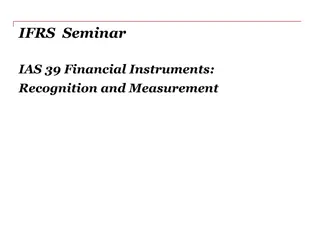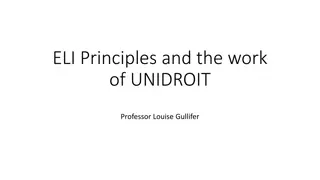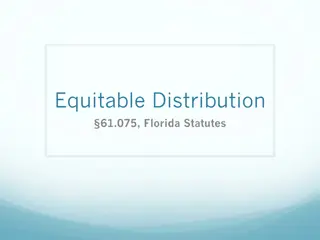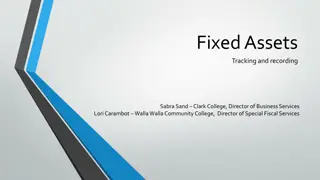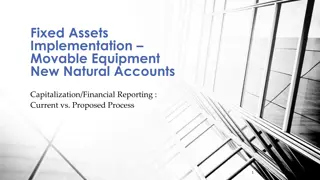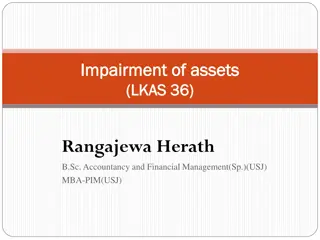
Security Interests in Digital Assets under Korean Law
Explore the nuances of security interests in digital assets under Korean law, including the challenges, limitations, and legal protection gaps faced in classifying and securing virtual assets. Discover methods such as possessory pledges, title transfers, security trusts, and smart contracts utilized to secure virtual assets effectively.
Download Presentation

Please find below an Image/Link to download the presentation.
The content on the website is provided AS IS for your information and personal use only. It may not be sold, licensed, or shared on other websites without obtaining consent from the author. If you encounter any issues during the download, it is possible that the publisher has removed the file from their server.
You are allowed to download the files provided on this website for personal or commercial use, subject to the condition that they are used lawfully. All files are the property of their respective owners.
The content on the website is provided AS IS for your information and personal use only. It may not be sold, licensed, or shared on other websites without obtaining consent from the author.
E N D
Presentation Transcript
Security Interests in Digital Assets under Korean Law Security Interests in Digital Assets under Korean Law - - Possibility, Limitations and Legal Protection Gaps Possibility, Limitations and Legal Protection Gaps Korea Advanced Institute of Science and Technology (KAIST) WooJung Jon
Civil Law Definition of Property Traditional Definition Virtual Assets = Uncharted Ownership Ambiguity In civil-law systems, "property" usually covers tangible objects. E.g.Korea's Civil Act Article 98 defines "things" as corporeal objects or controllable natural forces (like electricity). Virtual assets are intangible data entries on a ledger, not physical things or natural forces." They do not neatly fit the Article 98 definition of a transferable thing. Because they fall outside classical definitions, it is unclear if one's hold over cryptocurrency is a property right under civil law. This ambiguity undermines legal protection and transactions involving virtual assets.
Issues in Classification Neither Tangible nor Claim Excluded from Property 1 2 Virtual assets have no physical form and are not a right against another party, challenging the binary of chose-in- possession (tangible property) vs. chose-in-action (claim). Some courts in strict civil law jurisdictions refuse to treat crypto as "property." For example, Japanese courts ruled that Bitcoin is not "a thing" under the Civil Code, since only corporeal objects qualify as property. Legal Gap 3 This strict classification means holders of virtual assets may lack full property-rights protection (e.g. in theft or insolvency) because the law doesn't recognize their assets as property.
Challenges in Security Rights (Collateral) Pledging Difficulties No Clear Framework Traditional pledge law assumes a transfer of possession of a thing to the creditor. With virtual assets, there is no physical possession. Many secured transactions laws (e.g. civil codes, UCC Article 9 equivalents) did not envision digital tokens. It's uncertain how to "perfect" a security interest in crypto by registration, control, or other means under existing laws. Risk for Lenders Without legal clarity, lenders face risk in accepting crypto as collateral. A debtor could secretly transfer the asset, or courts might later rule the security interest invalid if the asset isn't recognized as property.
Methods of Securing Virtual Assets Possessory Pledge (Control) Title Transfer for Security Security Trust (Escrow) Smart Contract Collateral (DeFi) The asset is placed with a third- party trustee or custodian who holds it for the benefit of the creditor until the obligation is fulfilled. The trustee arrangement secures the asset and can act impartially, ensuring the debtor can't unilaterally misappropriate it. Creditor takes control of the asset (e.g. moving coins to a wallet controlled by the lender or handing over a hardware wallet). This mimics possession and might perfect a pledge by control of the private key. Debtor transfers ownership of the virtual asset to the creditor (or an agent) as collateral, under an agreement that it will be returned upon debt repayment. This outright transfer secures the debt but blurs legal ownership during the loan. Borrower locks the asset in a smart contract that automatically enforces the loan terms. The code will hold the crypto, trigger liquidation if default occurs, and release collateral when the loan is repaid. (This provides technical security without relying on a central party, though legal recognition of such arrangements is still evolving.)
Challenges in Enforcing Security Interests in Digital Assets Need for Debtor Cooperation Creditors cannot seize digital collateral on their own. Cryptocurrency transfers require wallet access and the private key. If the debtor refuses to share the key, the creditor has no direct means to retrieve the asset. Access Requires Private Keys Digital assets are managed by private keys linked to wallet addresses. Creditors lacking the debtor s private key cannot move or sell the asset, even in default. Without those credentials, the creditor s legal entitlements remain unenforceable. Necessity of Legal Proceedings Judicial Relief: Creditors must obtain a court order compelling the debtor to transfer or surrender the asset. Self-Help Limitations: Unlike tangible goods, repossession is futile without court oversight. Freezing Assets on Exchanges Court Orders: Judges may freeze the account or instruct the exchange to transfer the crypto to the creditor. Prevents Debtor Transfers: Such injunctions secure the asset for eventual satisfaction of the debt. Limits of Creditor Self-Help vs. Exchanges Exchanges owe duties to their customers and cannot freeze or release assets at a creditor s mere request. Formal legal process (injunction or attachment) is essential for the exchange to cooperate.
Attachment of Digital Asset Claims Under the Korean Civil Execution Act Civil Enforcement via Claim Attachment No Dedicated Statute: Korean law lacks a specific statute exclusively addressing virtual assets in private debt enforcement. Garnishment of Debtor s Right: If the debtor s crypto is on an exchange, the creditor garnishes the debtor s right to withdraw from that exchange. Attachment Order: Under the Korean Civil Execution Act, once the court issues an attachment order, the exchange (as a third-party obligor) must not release the asset to the debtor and ultimately deliver it to the creditor. Attachment of Claim vs. Asset Legal Distinction: Seizing the right to claim delivery of a digital asset is different from directly seizing the asset itself. Exchange as Garnishee: The crypto remains under the exchange s custody and is frozen by the attachment order. Cooperative Intermediary: This system relies on the exchange s cooperation to preserve the asset. Direct Attachment Challenges: Attempting to seize the asset itself, which is not held by a third party, is difficult. Nature of the Exchange-User Relationship Contractual Arrangement: Korean courts view the relationship as akin to a deposit or custody agreement. Not a Thing : Digital assets are not considered things under the Korean Civil Code.
Attachment of Virtual Assets Under the Korean National Tax Collection Act Legal Framework of Korean National Tax Collection Act Empowers Tax Authorities Order the debtor or a third party (exchange/custodian) to transfer the asset Direct the asset s transfer to a government wallet Attachment Procedure by Tax Authorities Transfer Request Domestic Exchange must move the asset to the tax office s account. Freezing Assets preventing the taxpayer from moving or liquidating it. If personally held in Private Wallets, non-compliance is a major concern. Post-Attachment Disposal Liquidation Option: Once attached, the Act allows selling the virtual asset to satisfy tax arrears. Seized crypto is sold at market price via an exchange.
Challenges of Private Key-Based Control vs. Benefits of Exchange-Based Security Interest Registry Enforcement Difficulties with Private Keys Private Key Duplication Irreversible Transactions Security Risks Difficult Foreclosure No Security Interest Registry in Current Crypto Exchanges Lack of Standardized Recording Absence of Public Notice Transparency Gap Traditional Exchanges Use Pledge Registries as a Model Established Mechanism Public Notice & Prevention of Double Collateralization Proven Enforceability Proposed Exchange Based Registry for Digital Assets Registry Implementation Locked from Transfer Public Notice Reliable and Transparent Framework for Digital Asset Collateral
Legislative Approaches (Comparative) U.S. UCC Article 12 UNIDROIT Principles 2023 The Uniform Commercial Code was updated in 2022 to address digital assets. Article 12 defines "controllable electronic records" (covering cryptocurrencies, NFTs, etc.) and provides rules for their transfer and for security interests in them. Notably, it introduces the concept of control as a way to perfect a security interest (analogous to possession for intangibles). An international effort led by UNIDROIT established Principles on Digital Assets and Private Law. These principles broadly define digital assets and set out basic rules for ownership, transfer, and third-party effectiveness, aiming for global harmonization. They endorse using "control" as a key concept and encourage legal systems to recognize digital assets as objects of property rights.
Summary of Legal Gaps Property Definition Collateral Laws 1 Virtual assets often do not qualify as "property" under civil codes Existing collateral laws do not squarely cover virtual assets 2 Legal Protection Enforcement Procedures 4 Owners and creditors lack the legal tools and protections available for traditional assets Enforcement procedures are ill- equipped to deal with self-custodied digital assets 3
Need for Reform Update Legal Definitions There is a growing consensus that legislatures must update legal definitions and frameworks to integrate digital assets. Expand Property Notion Scholars and law commissions urge expanding the notion of property to encompass digital assets or creating a new category fo r them. Adopt Control Concept Security transaction laws should adopt the concept of control (similar to UCC Article 12) to allow effective pledges of digital assets. Empower Courts Enforcement laws should empower courts to reach digital assets.
Policy Recommendations Draw on Emerging Models Harmonize Internationally Ensure Legal Clarity 1 2 3 Harmonizing these rules internationally would reduce uncertainty. Legal clarity and certainty in this area will support innovation in the digital economy while protecting rights and maintaining financial stability ensuring that digital assets can be integrated into the legal system rather than exist in a regulatory gray area. Policymakers should draw on emerging models (UCC Article 12's approach, UNIDROIT principles) to craft clear rules defining control of digital assets and mechanisms for using them as collateral.


